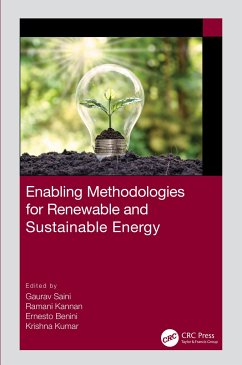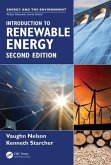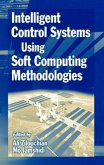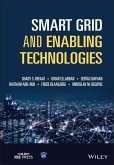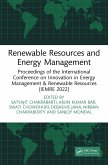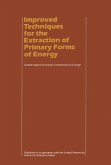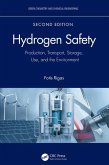Enabling Methodologies for Renewable and Sustainable Energy
Herausgeber: Saini, Gaurav; Kumar, Krishna; Benini, Ernesto; Kannan, Ramani
Enabling Methodologies for Renewable and Sustainable Energy
Herausgeber: Saini, Gaurav; Kumar, Krishna; Benini, Ernesto; Kannan, Ramani
- Gebundenes Buch
- Merkliste
- Auf die Merkliste
- Bewerten Bewerten
- Teilen
- Produkt teilen
- Produkterinnerung
- Produkterinnerung
This book aims to provide practical aspects and introduction to the application of various technological advancement tools viz. AI, ML, and IoT to model, characterize, optimize, forecast, and performance prediction of renewable energy exploitation including existing policies & case studies for understanding of renewable energy generation.
Andere Kunden interessierten sich auch für
![Introduction to Renewable Energy Introduction to Renewable Energy]() Vaughn C NelsonIntroduction to Renewable Energy174,99 €
Vaughn C NelsonIntroduction to Renewable Energy174,99 €![Intelligent Control Systems Using Soft Computing Methodologies Intelligent Control Systems Using Soft Computing Methodologies]() Ali Zilouchian (ed.)Intelligent Control Systems Using Soft Computing Methodologies186,99 €
Ali Zilouchian (ed.)Intelligent Control Systems Using Soft Computing Methodologies186,99 €![Smart Grid and Enabling Technologies Smart Grid and Enabling Technologies]() Shady S. RefaatSmart Grid and Enabling Technologies158,99 €
Shady S. RefaatSmart Grid and Enabling Technologies158,99 €![Renewable Resources and Energy Management Renewable Resources and Energy Management]() Renewable Resources and Energy Management175,99 €
Renewable Resources and Energy Management175,99 €![Improved Techniques for the Extraction of Primary Forms of Energy Improved Techniques for the Extraction of Primary Forms of Energy]() UN Economic Commission for EuropeImproved Techniques for the Extraction of Primary Forms of Energy41,99 €
UN Economic Commission for EuropeImproved Techniques for the Extraction of Primary Forms of Energy41,99 €![Circular Economy and Sustainable Energy Materials Circular Economy and Sustainable Energy Materials]() Circular Economy and Sustainable Energy Materials186,99 €
Circular Economy and Sustainable Energy Materials186,99 €![Hydrogen Safety Hydrogen Safety]() Fotis RigasHydrogen Safety166,99 €
Fotis RigasHydrogen Safety166,99 €-
-
-
This book aims to provide practical aspects and introduction to the application of various technological advancement tools viz. AI, ML, and IoT to model, characterize, optimize, forecast, and performance prediction of renewable energy exploitation including existing policies & case studies for understanding of renewable energy generation.
Hinweis: Dieser Artikel kann nur an eine deutsche Lieferadresse ausgeliefert werden.
Hinweis: Dieser Artikel kann nur an eine deutsche Lieferadresse ausgeliefert werden.
Produktdetails
- Produktdetails
- Verlag: CRC Press
- Seitenzahl: 232
- Erscheinungstermin: 17. Februar 2023
- Englisch
- Abmessung: 234mm x 156mm x 16mm
- Gewicht: 526g
- ISBN-13: 9781032224763
- ISBN-10: 1032224762
- Artikelnr.: 65938848
- Herstellerkennzeichnung
- Libri GmbH
- Europaallee 1
- 36244 Bad Hersfeld
- gpsr@libri.de
- Verlag: CRC Press
- Seitenzahl: 232
- Erscheinungstermin: 17. Februar 2023
- Englisch
- Abmessung: 234mm x 156mm x 16mm
- Gewicht: 526g
- ISBN-13: 9781032224763
- ISBN-10: 1032224762
- Artikelnr.: 65938848
- Herstellerkennzeichnung
- Libri GmbH
- Europaallee 1
- 36244 Bad Hersfeld
- gpsr@libri.de
Gaurav Saini is presently working as the Professor (Assistant) in the Department of Mechanical Engineering, Harcourt Butler Technical University Kanpur, Uttar Pradesh. He has Post-Doctoral Fellow experience with the Department of Sustainable Energy Engineering, Indian Institute of Technology Kanpur. Prior to joining IIT Kanpur, he was serving as the Professor (Assistant) in the School of Advanced Materials, Green Energy and Sensor Systems, Indian Institute of Engineering Science and Technology (IIEST) Shibpur, India. He received his Ph.D. in Turbomachines (Hydrokinetic Turbines) in the year 2020 and M. Tech (Fluid Machinery and Energy Systems) in the year 2014 from the Indian Institute of Technology Roorkee, Uttarakhand, India. After his Ph.D. from IIT Roorkee, he was working as project fellow in the department of hydro and renewable energy, Indian Institute of Technology Roorkee. His research areas include renewable energy (hydrokinetic energy, wind power, and biomass), Computational Fluid Dynamics (CFD) and fluid mechanics and turbomachines; fluid power. He has published several research publications on renewable energy technologies in different international journals of repute. He has also presented his research at different international and national platforms and he received accolades from various peers working in the same area across the globe. He is skilled in computational fluid dynamics (CFD) - numerical modelling and roto-dynamics analysis, multiphase flow analysis, modeling of various renewable energy resources viz. wind, marine, solar and hydrokinetic energy for rural applications, wind and hydrokinetic - technology selection and design, installation strategies, performance evaluation and O&M issues. Ramani Kannan is a Senior Lecturer in Universiti Teknologi PETRONAS, Malaysia. He received his BEng degree from Bharathiar University, India. Later, he completed his MEng and PhD in Power Electronics and Drives in Anna University. He holds more than 125 publications in reputed international and national journals and conferences; also, he has published six books. He has completed five funded projects and has seven research projects in progress. The grants are FRGS, ASEAN-India, YUTP, KETTHA, and STIRF. He is a chartered engineer (CEng, the UK), active senior member of IEEE (the USA), and member of IE (I), IET (the UK), ISTE (I), and Institute of Advanced Engineering and Science (IAENS). Dr. Ramani is recognized with many awards, including "Career Award for Young Teacher" from AICTE India, 2012; "Young Scientist Award" in power electronics and drives, 2015; "Highest Research Publication Award" 2017; Award for Outstanding Performance, Service and Dedication 2019 at UTP, Malaysia; "Outstanding Researcher Award" at UTP, Q Day 2019; and Best Presenter Award, IEEE CENCON 2019 international conference at Indonesia. He actively serves as Secretary, IEEE Power Electronics Society, Malaysia, since 2020. He is the Editor-in-Chief of the Journal of Asian Scientific Research (2011-2018) and Regional Editor of the International Journal of Computer-Aided Engineering and Technology, Inderscience Publishers, the UK, from 2015. He is an Associate Editor of the IEEE Access journal since 2018. He is Editor of International Transactions on Electrical Energy Systems (ITEES Wiley) since 2021 and is Section Editor of Platform: A Journal of Engineering, UTP Press, MY, since 2020. He is an Associate Editor of the Advanced Materials Science and Technology journal since 2020. Dr. Ramani serves as a guest editor for many publishers such as Elsevier, Inderscience, IGI Global, CRC, Taylor & Francis, Bentham Science, and IJPAM. His research interest involves power electronics, inverters, modeling of induction motor, AI, machine learning, and optimization techniques. Ernesto Benini graduated with honors in Mechanical Engineering (1996) And obtained his PhD in Energy Technology (2000). He is currently a Professor of "Fluid Machinery" at the Department of Industrial Engineering of the University of Padua, Italy. He has more than 20 years of experience in the research and development of advanced methods for the design and optimization of fluid machines involving renewables. He is responsible for numerous private and European research projects and is a scientific advisor for major international companies in the renewable energy sector. He is a senior member of ASME and AIAA. He serves as Editor of authoritative scientific journals such as ASME Journal of Engineering for Gas Turbines and Power and International Journal of Turbo & Jet Engines. He has authored and co-authored about 300 scientific publications concerning the fluid dynamics of machines. He has received numerous awards for his academic and scientific activities, including numerous "Best Paper Awards" and the gold medal for the Best Academic Curriculum, and was nominated for the New York Academy of Sciences' "Outstanding Young Researchers" award. Krishna Kumar is presently working as a Research and Development Engineer at UJVN Ltd. Before joining UJVNL, he worked as an Assistant Professor at BTKIT, Dwarahat (Uttarakhand), India. He received his B.E. (Electronics and Communication Engineering) from Govind Ballabh Pant Engineering College, Pauri Garhwal, Uttarakhand, India, and M. Tech (Digital Systems) from Motilal Nehru National Institute of Technology, Allahabad, India. He is also pursuing his PhD in the Indian Institute of Technology Roorkee, India. He has more than 12 years of industrial and teaching experience and has published numerous research papers in international journals such as IEEE, Elsevier, Taylor & Francis, Springer, and Wiley. His research area includes renewable energy, artificial intelligence, cloud computing, and the Internet of things.
1. Evolution of Sustainable Energy from Power Concrete Construction 2.
Acetylene as a Sustainable Fuel for Diesel Engine: A Case Study 3.
Investigation on Stand-Alone Solar Energy Conversion System with Artificial
Intelligence Techniques 4. Effective Efficiency Distribution
Characteristics for Different Configurations of Arc and V-Shape Ribs in
Solar Air Channels: A Comparative Study 5. Lithium-Based Batteries Charged
by Regenerative Braking Using Second Quadrant Chopper 6. Modeling and
Simulation of SoC-Based BMS for Stand-Alone Solar PV-Fed DC Microgrids 7.
Blockchain and Smart Grid 8. Renewable Energy Source Technology with
Geo-Spatial-Based Intelligent Vision Sensing and Monitoring System for
Solar Aerators in Fish Ponds 9. IoT-Based Dam and Barrage Monitoring System
10. Complex Hydrides: Lightweight, High Gravimetric Hydrogen Storage
Materials 11. Assessing the Feasibility of Floating Photovoltaic Plant at
Mukutmanipur in India 12. Floating Photovoltaic Systems: An Emerging PV
Technology 13. Waste Heat Recovery Technologies for Sustainability and
Economic Growth in Developing Countries
Acetylene as a Sustainable Fuel for Diesel Engine: A Case Study 3.
Investigation on Stand-Alone Solar Energy Conversion System with Artificial
Intelligence Techniques 4. Effective Efficiency Distribution
Characteristics for Different Configurations of Arc and V-Shape Ribs in
Solar Air Channels: A Comparative Study 5. Lithium-Based Batteries Charged
by Regenerative Braking Using Second Quadrant Chopper 6. Modeling and
Simulation of SoC-Based BMS for Stand-Alone Solar PV-Fed DC Microgrids 7.
Blockchain and Smart Grid 8. Renewable Energy Source Technology with
Geo-Spatial-Based Intelligent Vision Sensing and Monitoring System for
Solar Aerators in Fish Ponds 9. IoT-Based Dam and Barrage Monitoring System
10. Complex Hydrides: Lightweight, High Gravimetric Hydrogen Storage
Materials 11. Assessing the Feasibility of Floating Photovoltaic Plant at
Mukutmanipur in India 12. Floating Photovoltaic Systems: An Emerging PV
Technology 13. Waste Heat Recovery Technologies for Sustainability and
Economic Growth in Developing Countries
1. Evolution of Sustainable Energy from Power Concrete Construction 2.
Acetylene as a Sustainable Fuel for Diesel Engine: A Case Study 3.
Investigation on Stand-Alone Solar Energy Conversion System with Artificial
Intelligence Techniques 4. Effective Efficiency Distribution
Characteristics for Different Configurations of Arc and V-Shape Ribs in
Solar Air Channels: A Comparative Study 5. Lithium-Based Batteries Charged
by Regenerative Braking Using Second Quadrant Chopper 6. Modeling and
Simulation of SoC-Based BMS for Stand-Alone Solar PV-Fed DC Microgrids 7.
Blockchain and Smart Grid 8. Renewable Energy Source Technology with
Geo-Spatial-Based Intelligent Vision Sensing and Monitoring System for
Solar Aerators in Fish Ponds 9. IoT-Based Dam and Barrage Monitoring System
10. Complex Hydrides: Lightweight, High Gravimetric Hydrogen Storage
Materials 11. Assessing the Feasibility of Floating Photovoltaic Plant at
Mukutmanipur in India 12. Floating Photovoltaic Systems: An Emerging PV
Technology 13. Waste Heat Recovery Technologies for Sustainability and
Economic Growth in Developing Countries
Acetylene as a Sustainable Fuel for Diesel Engine: A Case Study 3.
Investigation on Stand-Alone Solar Energy Conversion System with Artificial
Intelligence Techniques 4. Effective Efficiency Distribution
Characteristics for Different Configurations of Arc and V-Shape Ribs in
Solar Air Channels: A Comparative Study 5. Lithium-Based Batteries Charged
by Regenerative Braking Using Second Quadrant Chopper 6. Modeling and
Simulation of SoC-Based BMS for Stand-Alone Solar PV-Fed DC Microgrids 7.
Blockchain and Smart Grid 8. Renewable Energy Source Technology with
Geo-Spatial-Based Intelligent Vision Sensing and Monitoring System for
Solar Aerators in Fish Ponds 9. IoT-Based Dam and Barrage Monitoring System
10. Complex Hydrides: Lightweight, High Gravimetric Hydrogen Storage
Materials 11. Assessing the Feasibility of Floating Photovoltaic Plant at
Mukutmanipur in India 12. Floating Photovoltaic Systems: An Emerging PV
Technology 13. Waste Heat Recovery Technologies for Sustainability and
Economic Growth in Developing Countries

